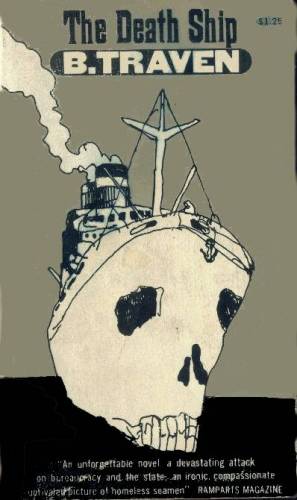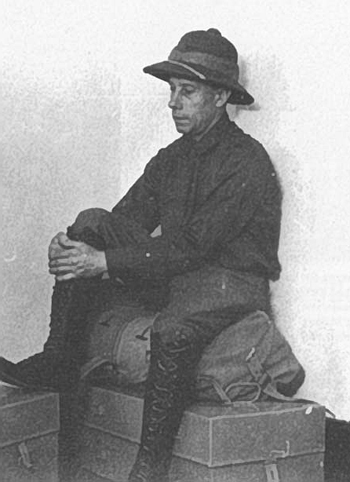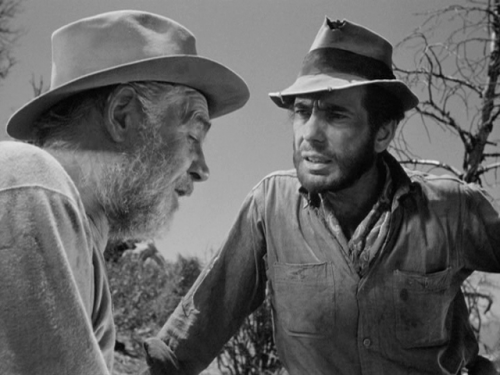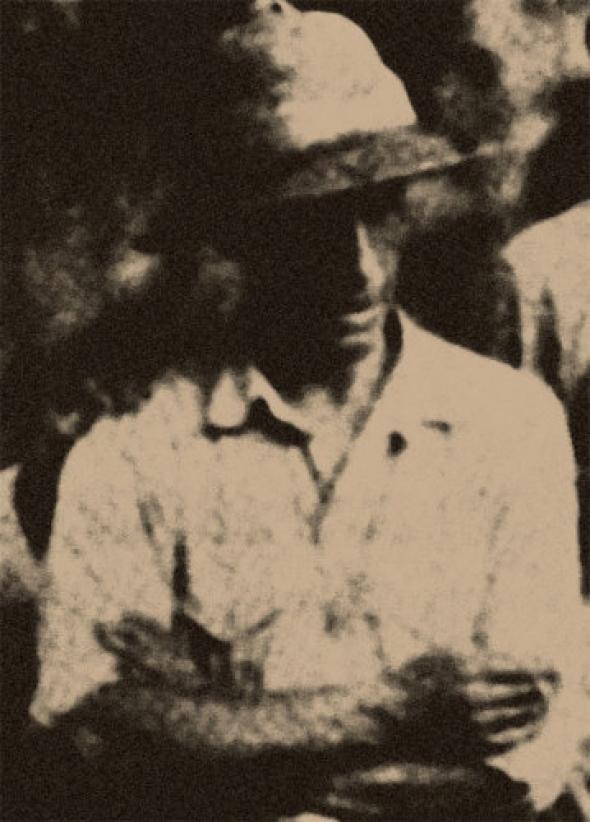Is the Brickburner Still the Same?
With his insistent psychologisation of the elusive novelist B. Traven, '70s documentary film-maker and biographer William Wyatt demonstrates a singular inability to understand the political stakes of refusing identification. Neinsager opens and then firmly shuts the Traven file again
Nothing can be more contemptible than to suppose public records to be true.
- William Blake
I decided to retire from private life.
- Karl Kraus
At some point in the 1970s, a BBC documentary maker named William Wyatt became obsessed with ‘B.Traven'. Traven's books (which Wyatt misread egregiously) and the revolutionary activity of Ret Marut amounted, at most, to sources of ‘clues' for the BBC man's detective quest.i With the help of the state broadcaster's culture budget and the natural titanium-skulled effrontery of the media professional, Wyatt managed after several years to make a TV show and write a book, The Man Who Was B. Traven,ii confirming usefully that Traven and Marut were the same person, and more or less uselessly identifying him with one Otto Feige, born 1882 in Schwiebus, East Prussia (now the Polish town of Swiebodzin).iii
There's no longer any reason to dwell on this feat of subvention-driven detective work, or on any ‘injustice' done to Traven, even where Wyatt mistakes the Yorikke for the eponymous ‘Death Ship' in a perfunctory plot summary of the book. What does still matter, though, is the precise aspect of Traven's work and life that Wyatt failed with almost heroic stubbornness to understand. Because personal ‘identity' as the documentarist conceives it (the most precious thing to cling to, trade on, etc., unless you have something to hide) is really a police matter, and Traven's flight from the whole set-up is urgently instructive for everyone within the reach of (state or private sector) institutions.
What Wyatt was fixated on (even to the point of flicking through the Traven books, or at least getting an intern to do it), was not just the ‘real' name and biography of the author, but his even more mysterious reasons for going to such lengths to conceal these things: his perverse refusal of the recognition (and much of the funding) that all Creatives crave. As Wyatt saw it, only some deep psychological anomaly could explain Traven's insistence on living for 50 years in Mexico under a welter of pseudonyms and pseudonationalities, making himself deliberately ‘hard-(if not impossible)-to-reach' when the world was so eager to reach out to him.iv Didn't this autistic tic show up symptomatically in the skimmed books, in the form of tall tales of characters' loss of (or failure to acquire an) officially verifiable identity? Sometimes these outbreaks even came attached to polemics against birth certificates, passports, the sacred symbols of citizenship itself!
Wyatt admitted that Marut/Traven might have had reason to run away from the German police, and to keep running during the Nazi period. But he couldn't bring himself to believe that there was no more psychological depth to the ‘mystery' than that. Perhaps the biographer had trouble taking seriously the idea of a Social Democratic death sentence? As a Frequent Flyer on BBC tickets, he may well have struggled to imagine how the border management, public records and cultural machinery of enlightened, liberal states could appear as a threat to the person, rather than miraculous means for extending personal freedom. Yet the practical workings of this threat are exactly what Traven's books describe, most of all The Death Ship, which takes place in a juridical limbo between the USA, Germany, France, the Netherlands, Belgium and finally the UK, where the narrator was on his way to be interned as an undocumented alien until the actual Death Ship of the title, the British Empress of Madagascar, sank on schedule, scuttled for the insurance claim. (Fiege/Marut/Traven was interned in Brixton prison and ‘recommended for deportation' in December 1923.)
Wyatt quotes this passage from The Death Ship, but somehow fails to get the point that a particular person's relation to the civil apparatus of ‘identity' - whether it shelters your status and property or consigns you to ‘bare life' - is a matter of class. The demonstration is clear in The Death Ship, with its accidentally stateless narrator and the ‘Anacharsis Clootz deputation' joining him in perpetual exposure to ‘work-related' death at sea, but it also applies in the Mexican novels, where the life of indigenous workers in logging, oil drilling or crop picking is just as disposable inside the ‘national territory' as that of the coal drag adrift between ports and expulsions.v In both cases the disposability of labouring life is guaranteed by the state; in fact the lethal threat from the administration of ‘identity' is most acutely expressed in the ‘Jungle' series, where the indentured workers are bound to the logging camps, carreta trains or simple peonage by the debt that endlessly accrues to their recorded names.

Having managed to ignore (even while quoting from them) some eleven volumes of writing on the everyday workings of the relation between class, institutions and ‘identity', Wyatt was left with the impression that Traven's ‘purist line', his ‘overt political views', were too abstract to be anything more than a ‘theoretical basis for his anonymity'. Real ‘life choices', especially when so perverse as to cut off the Creative Artist's life-blood of publicity, could only be explained by ‘some powerful practical[!] or personal reasons supplying the urge for him to construct his rationale'. According to the modern middle-class common sense propounded so neatly here, it's inconceivable that ‘overt political views' could have anything to do with immediate material self-interest in matters of life and death. Ideological team colours are a matter of ethical taste, something to be picked out at leisure from the options available, when work is over and danger far away.
Once the non-existent riddle of Traven's deep motive for self-concealment was formulated, there could be no doubt where the answer would lie. The depth ascribed to the mystery was enough in itself to ensure that the solution would lie in personal pathology, the journalist's and biographer's playground. The character assassination defies paraphrase. ‘How', wrote Wyatt after hunting down the surviving members of Feige/Traven's estranged family, ‘could he - a misbegotten child, torn from his beloved grandparents, prevented from following his destiny - allow a significance to birth and parentage?' Thus afflicted, Traven ‘denied the importance and even the meaning of such labels, and eventually tore off the ones he had been given, adopting some of his own choosing.' This cheap piece of analysis might have sufficed to satisfy BBC viewers awaiting a psychological answer to the elusive-writer ‘mystery'. But, lest the casting off of meaningful labels be mistaken for some kind of liberating gesture (or even a tactical, pragmatic one), the childhood complex is connected to the adult anonymity by way of a whole nest of incriminating symptoms.
Traven moved to the perimeter of life in childhood and observed the activity from there for the remainder of his years. The self-contained child became the anonymous writer, staying on the edge of the throng in order to avoid being hurt... He was not the power out in the sun that he was behind his desk, where he could describe and pronounce upon the world without having to face it.

Image: Otto Feige aka B. Traven aka Ret Marut
And: ‘In person he was often a mouse, reduced to sulking when he did not have his way.' Concerning Traven this is nothing but a barrage of libel, but at the same time it's a Sierra Madre of revelation about the ubiquitous culture and presumptions of media professionalism. The perimeter of life! Not facing the world! In Traven's case, these refer to: fighting in the German revolution, escape from custody and flight from a death sentence for treason, itinerant labour at sea and on land, prison and deportation, entanglement in primitive accumulation in Mexico... As opposed, no doubt, to a ‘centre' consisting of international networking, commissioning negotiations, long lunches with informants, business class departure lounges... Traven's human inadequacy is further illustrated with an anecdote from the filming of Treasure of the Sierra Madre, which the writer attended in the guise of ‘Hal Croves', ‘agent and translator'. ‘Diminutive' Croves/Traven was ridiculed non-stop by John Huston for his diffidence and seriousness. At one point ‘Croves' annoyed the great director by displaying incompetence at marlin fishing, and then compounded the offence when he ‘apologised humbly over and over'.
Thus Traven's flight from identification (along with its political ‘rationale') is not just the symptom of a ‘misbegotten childhood' complex, it marks him out as an all-round spiritual homunculus. Most damning of all is his failure to ‘face the world' like a Frequent Flier, his disinclination to seek centre-stage like a creative entrepreneur, a ‘man of action' in the mould of Hemingway, say, or Huston, or... William Wyatt. The producer found it ‘no surprise' that Traven ‘felt comfortable with the Mexican Indians', for these fellow losers ‘were uncompetitive and with them he was unchallenged'.
If competing for personal glory is the criterion of ‘manhood', and such manhood the measure of all activity, then production itself is nothing; the work is merely a by-product of the struggle for personal affirmation, and insisting on its primacy, as Traven often did, is just an excuse for cowardly failure at self-promotion.vi Perhaps this principle explains Wyatt's inattentive to say the least reading of Traven's actual books.
But it's more than a matter of misreading. The ‘solution' to the ‘Traven mystery' unfolds into a gigantic, almost visionary affirmation of the universal Truth of Public Records, and the duty of the individual to conform to them. This is what gives the otherwise trivial detective story its frightening contemporary resonance. The following passage from Rebellion of the Hanged is quoted by Wyatt as evidence of the author's pathology.
The first thing we must do is attack the registry and burn the papers, all the papers with seals and signatures deeds, birth and death certificates, tax records, everything ... Then nobody will know who he is, what he's called, who was his father, and what his father had ... What do we want with birth certificates?
‘Traven', reads the gloss, ‘was pleased with his own cleverness at dodging questions, tricking officials and confusing the files, but by abandoning his true identity he compounded his difficulties and kept the wounds of his childhood sore.' Thus, ‘with the blind unreasonableness of the obsessed, he hated officials for disbelieving him and for insisting on proof of what he said, when all the time he was telling them lies.' In other words, ‘the files', the official records, are always, already, inviolably true: their purpose is to define the truth. So much so that any pretence to dispute or deviate from them will inevitably be punished by the return of the repressed ‘true identity' in the form of infantile trauma.
By now it will come as no surprise that Wyatt ignores the fierce and consistent contestation throughout all Traven's writing of the definition of ‘truth' and ‘lies' embodied in ‘the files'. But a biographer with less of a natural affinity for police work might at least have wondered: does all this still apply when the files make your ‘true identity' that of a condemned traitor to ‘your' nation-state (or, for that matter, a ‘benefit thief')? And in such a case, will ‘difficulties' really be ‘compounded' more by denial of ‘true identity' than by surrender to it? The real argument against institutional ‘truth' follows on from these banal points, although it runs quickly out of the reach of journalistic common sense. With furious persistence, Traven shows again and again that public records exist to record property rights, in the fullest sense. The property owned, or not owned, or the debts owed, by an individual. The individual's status as property of a nation state, to be disposed of in war or criminal court. Labour as the property of the employer, whose ‘sovereign decision over life and death' in the jungle or at sea only follows this principle as far as its logic leads.

Image: Still from John Huston's The Treasure of the Sierra Madre, 1948
This kind of ‘truth' is true insofar as it's in your interest to accept the definition of ‘identity' in terms of property. Which is to say, once again, the meaning of ‘true identity' varies according to class. If the truth inscribed in the files turns you into property, your only options are to compete for some scrap of ownership on the terrible terms given (the near-ubiquitous response in much of the world today, with well-known results for the vast majority of competitors), or to reject altogether the terms and their underlying property-based definition of truth, at which point your ‘true identity' on record becomes a lie.
In practice, however, many of those forced or seduced into at least partially competing discover their recorded ‘identity' to be so overwhelmingly disadvantageous that they have to disown it just to stay afloat in the game. This is what the terms ‘informal economy' and ‘grey market' refer to. These phenomena arise inevitably because the ‘truth' of institutional, property-based ‘identity' NEVER represents the reality of the system that revolves around it. By foisting onto the individual sole ‘responsibility' for what she ‘owns' and ‘owes', public records systematically occlude the social process that put her in that position. ‘A debt is a debt': individual liability for the results of many people's combined actions is unlimited.vii For this reason, resistance to the ‘truth' of the files has nothing whatsoever to do with upholding ‘privacy'. ‘Civil' liberties are beholden by definition to the database state. Anonymity is necessary not in order to perfect the separation of billions of little monads, but to destroy the shameful fiction of personal agency and responsibility that thwarts perception and practice of human interdependence. Self-abolition is the historical mission of the proletariat, wrote Marx; when the ‘self' is the one defined by the (national, financial, municipal, educational, medical...) records, the same thing goes for proletarians.
* The title of this essay is drawn from an open letter to the disappeared Ret Marut, by Bavarian revolutionary comrade Erich Mühsam. Cited by W. Wyatt.
Neinsager languishes in the margin for error
Acknowledgement
For the best account of Marut/Traven's revolutionary activity and writing, taking everything worth knowing from Wyatt's book while defending political and writerly anonymity, see Ret Marut (another one, but the point is that that's not the point), B. Traven, ‘An Anti-Biography', http://libcom.org/library/b-traven-anti-biography. The present article was only possible thanks to this one.
Footnotes
i Marut was a name used by the man who became Traven from the time of his early life as an itinerant stage actor through the publication of his anarchist magazine Der Ziegelbrenner ('The Brickburner: Criticism of Current Conditions and Disgusting Contemporaries', first appearing 1917) and participation in the Bavarian revolution and Räterepublik of 1918-19, until some time after his subsequent escape from arrest and flight from a high treason charge. See the libcom.org article cited in the acknowledgement above.
ii William Wyatt, The Man Who Was B. Traven, Johnathan Cape, 1980
iii The identification seems likely to be correct, but the point is, if Traven didn't want it to be known, and it tells us precisely nothing about his writing or the world he wrote about, what is the point of discovering it?
iv For more on this UK welfare system designation for working class refusers of the debt of 'identity', see Madame Tlank, 'The Battle of All Mothers', Mute, July 2008, http://metamute.org/en/The-Battle-of-all-Mothers
v Herman Melville's term for the multinational crew of the Pequod, named for the spokesman of the soon-exterminated internationalist element of the French Revolution and the Commune of 1793. Apart from Moby Dick itself, see Loren Goldner, Herman Melville, Queequeg Books, New York, 2006, and Jules Michelet, Histoire de la Révolution Française, Gallimard, Paris, 1952.
vi In Wyatt's book, first published 1980, the ideal of the bold, creative, networking competitor, which today is incessantly drilled into both sexes, appears at the moment of its genesis in an Action Man ethos which is avowed less often 30 years later, now that the hirsute antics of a Hemingway or Huston may occasionally raise a laugh.
vii For detailed explication of some of what this mantra means in practice, see various writings by Michael Hudson at http://michael-hudson.com.
Mute Books Orders
For Mute Books distribution contact Anagram Books
contact@anagrambooks.com
For online purchases visit anagrambooks.com








